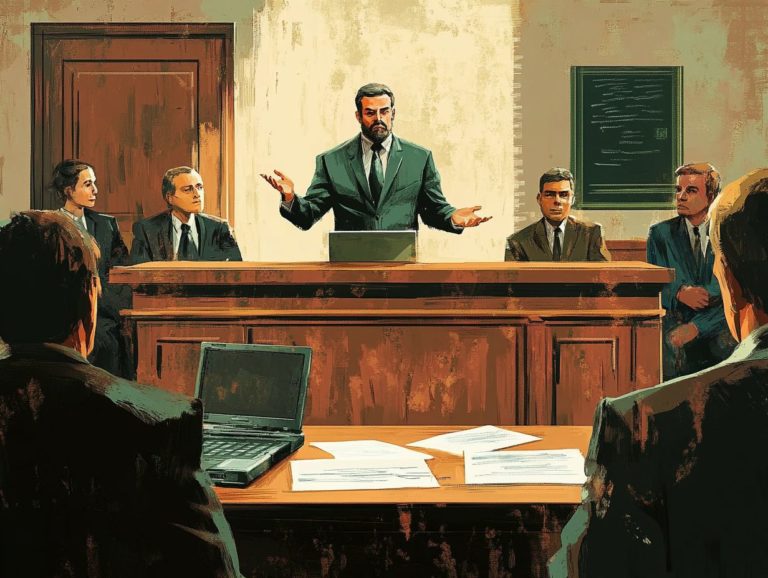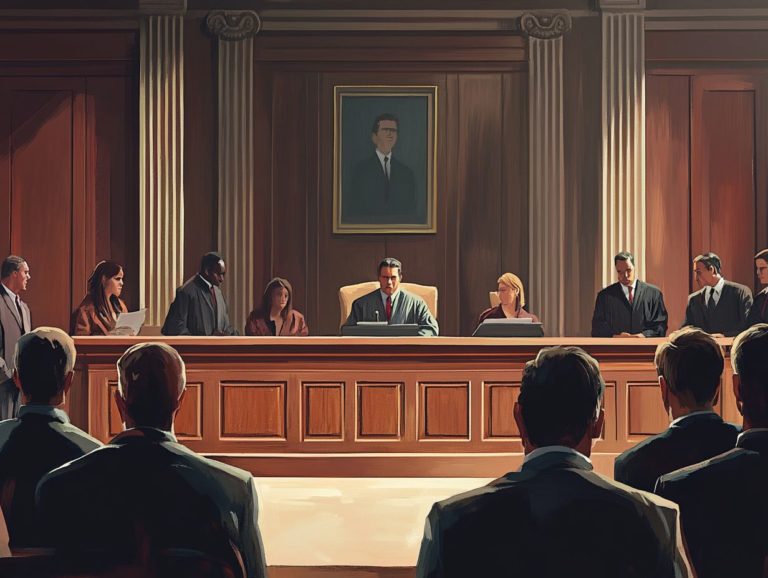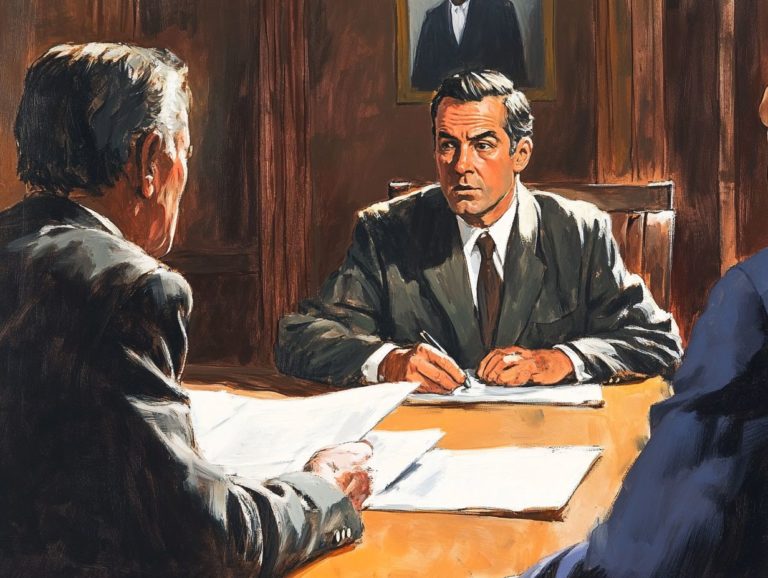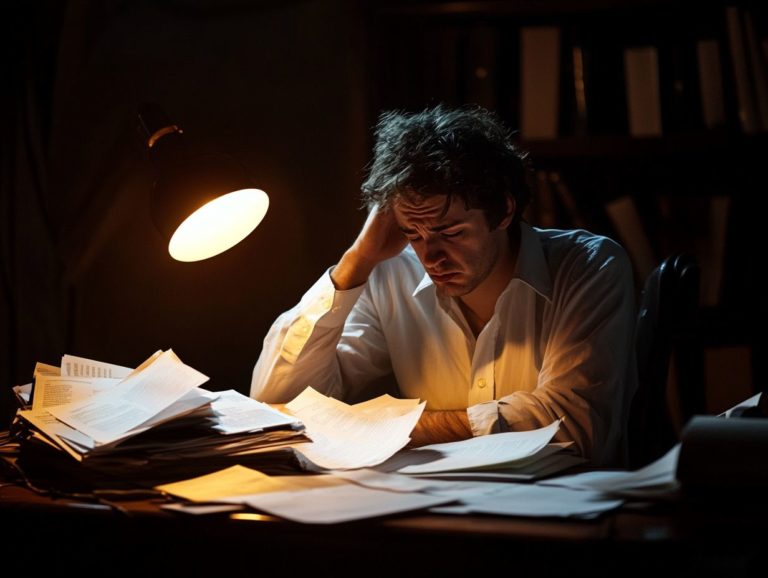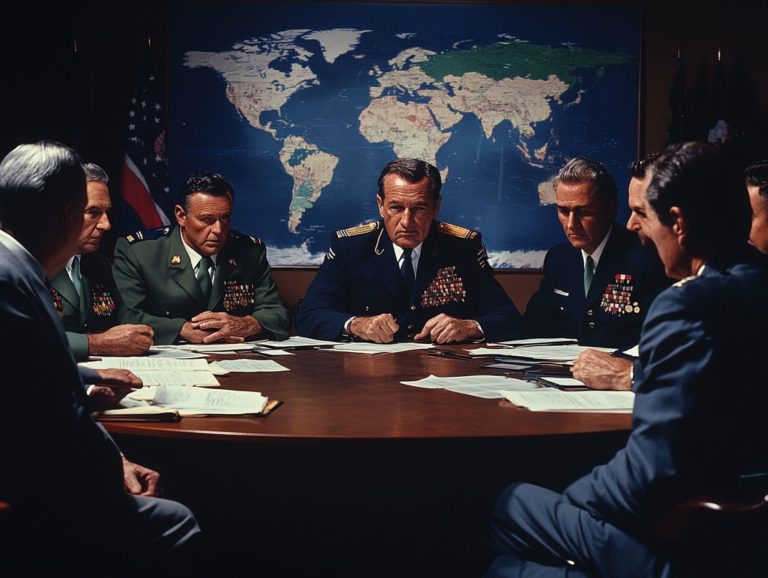Five Myths About Criminal Defense Strategies
Embark on this eye-opening journey to understand criminal defense! Navigating the intricate landscape of criminal defense can be daunting, especially when misconceptions cloud your judgment and impede effective strategies.
This article aims to debunk five prevalent myths that often lead defendants and their families astray. From the belief that a strong offense guarantees victory to the assumption that a defendant’s character has no impact in court, you’ll uncover the truths behind these misconceptions.
We ll delve into how to select the right defense strategy tailored to your unique case, the paramount importance of securing a skilled attorney, and the most effective methods to challenge the prosecution s evidence.
As you journey through this exploration of criminal defense, you’ll gain the insights necessary to make informed decisions and navigate your path with confidence.
Contents
- Key Takeaways:
- 1. The Best Defense Is Always a Strong Offense
- 2. A Good Lawyer Can Get You Off the Hook No Matter What
- 3. The Defendant’s Character Doesn’t Matter
- 4. The Prosecutor Will Always Have Strong Evidence
- 5. A Jury Will Always Side with the Prosecution
- What Are the Most Common Criminal Defense Strategies?
- What Factors Should Be Considered When Choosing a Defense Strategy?
- How Can a Defense Strategy Be Tailored to a Specific Case?
- What Are the Potential Consequences of Choosing the Wrong Defense Strategy?
- How Can a Defense Attorney Help in Developing a Strong Defense Strategy?
- What Are the Most Effective Ways to Challenge the Prosecution’s Evidence?
- Frequently Asked Questions
Key Takeaways:
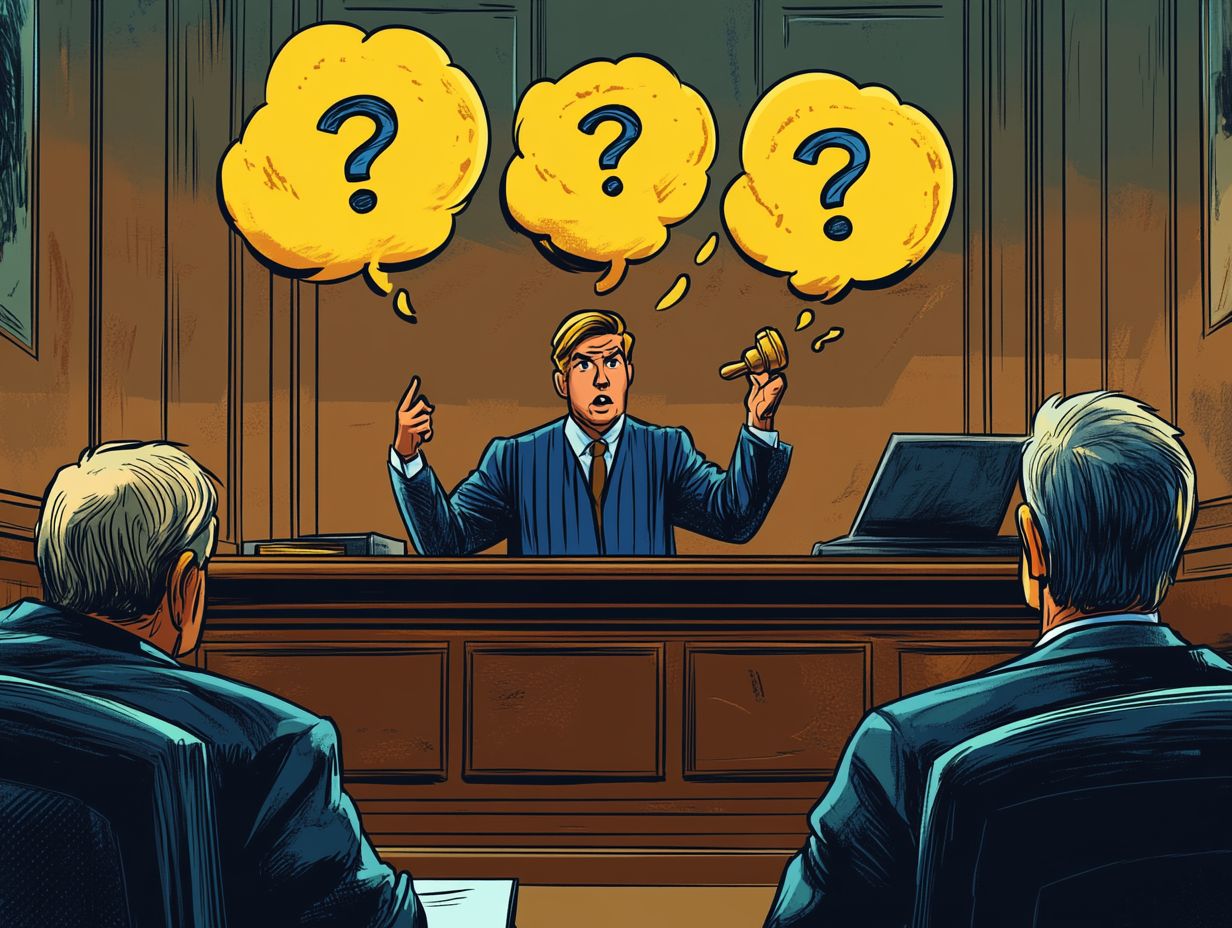
A strong offense does not guarantee a successful defense.
Each case is unique and requires a tailored defense strategy.
A good lawyer is essential but cannot guarantee a win.
The defendant’s character and evidence also play a crucial role in the outcome of a case.
The defendant’s character can influence the jury’s perception and decision.
A strong defense strategy takes this into consideration.
1. The Best Defense Is Always a Strong Offense
In the realm of criminal law, the adage “the best defense is always a strong offense” holds profound significance. Effective criminal defense lawyers use their specialized knowledge to create formidable legal representation that confronts criminal charges head-on.
This proactive approach allows defense attorneys to engage actively with evidence that may work against you. They carefully examine the prosecution’s arguments and their presentation.
By mastering courtroom dynamics, skilled attorneys can redirect focus, spotlighting inconsistencies and reasonable doubts that may undermine the prosecution’s narrative. Such a strategy not only helps in crafting a compelling case but also significantly eases the emotional burden you may feel.
The complex legal landscape needs a skilled guide; thus, enlisting a defense attorney is essential for navigating these intricate challenges effectively.
2. A Good Lawyer Can Get You Off the Hook No Matter What
One common misconception about the legal system is that a good lawyer can effortlessly get you off the hook for any crime. However, the reality is that effective legal representation demands a deep understanding of the complexities of the law and the nuances of criminal charges.
Grasping the specific charges and responsibilities you face is crucial; it shapes your legal strategy and affects possible outcomes. Skilled criminal defense lawyers are essential in negotiating plea bargains agreements where a defendant pleads guilty to a lesser charge to reduce their sentence often using their expertise to secure favorable terms.
They carefully challenge the evidence presented by the prosecution, examining every detail to ensure you receive a fair trial. You must dispel the myth that lawyers possess limitless power; their true effectiveness stems from their legal knowledge and their ability to navigate intricate legal landscapes to advocate for you as effectively as possible.
3. The Defendant’s Character Doesn’t Matter
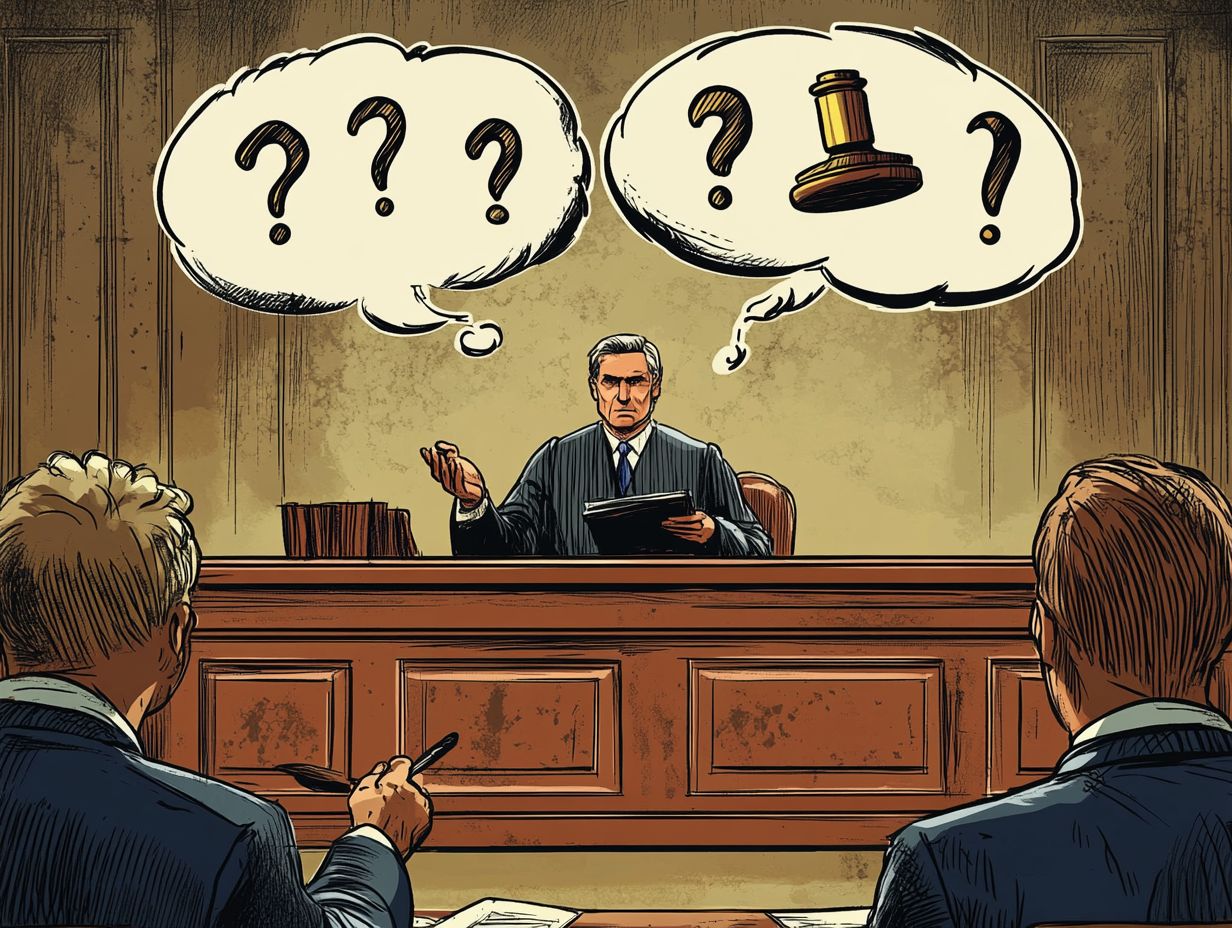
There s a prevalent myth that a defendant’s character has no bearing on their trial. However, it’s crucial for defense attorneys to emphasize the presumption of innocence and the fundamental rights of the accused, especially regarding the evidence against them.
In many instances, preconceived notions can lead jurors to develop biases solely based on a defendant’s background or past actions. This highlights the necessity for a skilled defense strategy aimed at dismantling negative stereotypes and unwarranted assumptions.
Ethical guidelines require defense lawyers to ensure that their client’s character is represented accurately, redirecting focus back to the evidence rather than harmful personal narratives. By employing carefully crafted courtroom tactics such as character witnesses or showcasing community support the defense can shape a more favorable perception.
This challenges the jury to evaluate the case based on its merits rather than public opinion.
4. The Prosecutor Will Always Have Strong Evidence
Many people think prosecutors always have overwhelming evidence. However, experienced defense attorneys often spot weaknesses in their cases.
These skilled lawyers advocate vigorously for the rights of the accused. They carefully examine each piece of evidence, checking its reliability and how it was collected.
For example, they may challenge witness testimonies or forensic evidence, arguing it was mishandled or biased. Their experience helps them identify inconsistencies that could create doubt.
By anticipating the prosecution’s strategy, defense attorneys build strong counterarguments. This ensures fair trials and upholds justice.
5. A Jury Will Always Side with the Prosecution
It may seem juries always favor the prosecution, but skilled defense lawyers understand courtroom dynamics. They know many factors influence jury decisions.
From juror biases to how evidence is presented, these elements can sway opinions. With effective strategies, defense lawyers reshape narratives and challenge perceptions.
Plea deals are vital in navigating the legal system. By advising defendants about plea options, defense attorneys can lead to lesser charges and reduced sentences.
What Are the Most Common Criminal Defense Strategies?
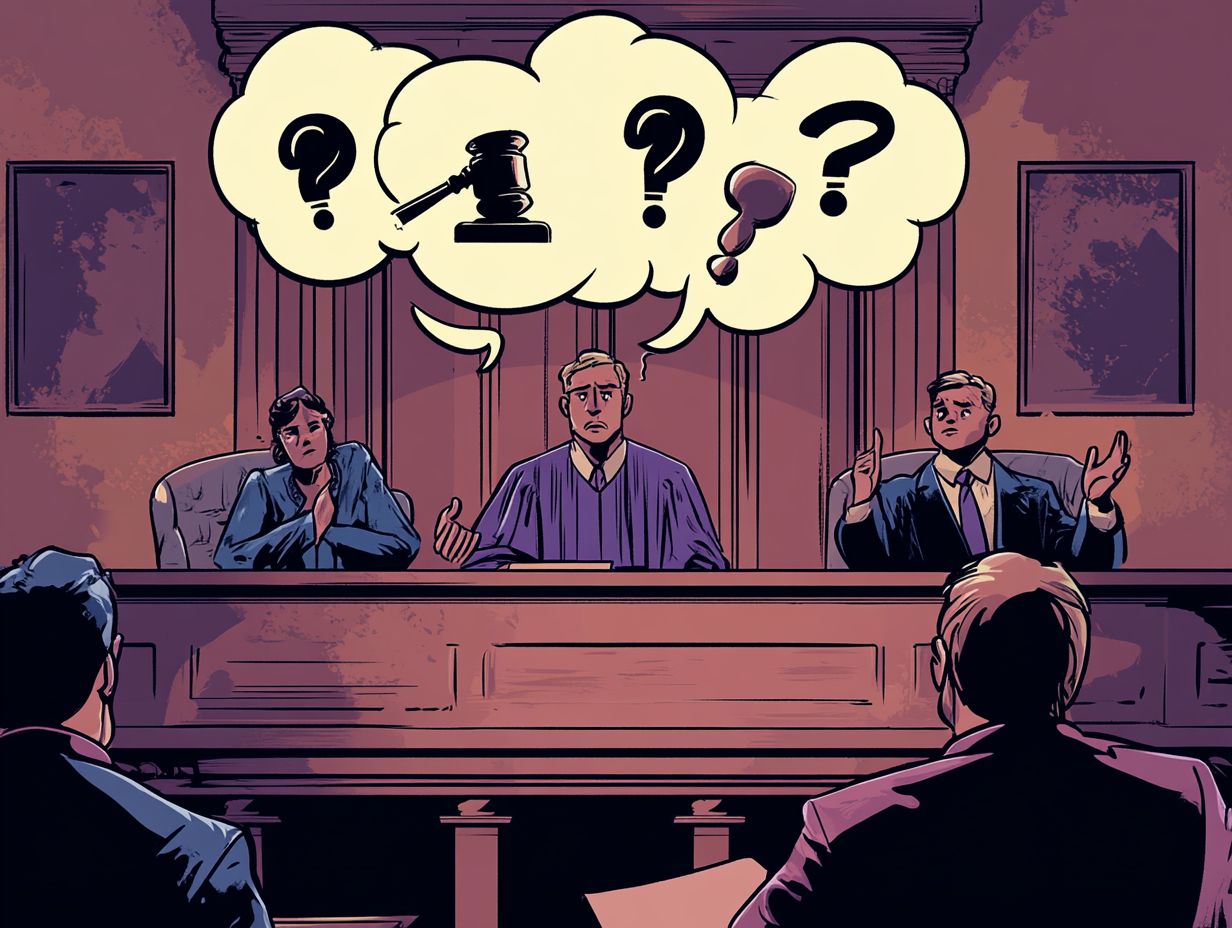
Criminal defense lawyers use various strategies to secure the best outcome for you. They ensure your rights are understood and upheld.
Common strategies include alibi, self-defense, and plea bargains, tailored to your unique case.
An alibi can be powerful by showing you were elsewhere during the crime, raising doubt about your involvement. Self-defense justifies actions taken to protect yourself from harm.
Plea bargains offer a chance to negotiate lesser charges for a guilty plea. Your attorney will carefully evaluate these options to guide you effectively.
These strategies highlight the importance of legal guidance tailored to your situation.
What Factors Should Be Considered When Choosing a Defense Strategy?
When choosing a defense strategy, consider the charges, available evidence, and the emotional toll this process may have on you.
Carefully evaluating these factors is key, as they can greatly influence your approach. Understanding how charges line up with case law isn t just academic; it can shape your strategy and outcome.
Guidance from seasoned defense lawyers is crucial. Their expertise lights the way by clarifying the strengths and weaknesses of the evidence and helping craft effective arguments.
How Can a Defense Strategy Be Tailored to a Specific Case?
Tailoring a defense strategy to your specific case requires a thorough analysis of the circumstances surrounding the charges, your background, and any prior courtroom experiences that could inform your legal representation.
This customization demands a keen understanding of how your history, such as previous convictions or psychological evaluations, might sway jury perceptions or influence plea negotiations.
For example, if you have a clean record, your defense attorney might highlight this to strengthen character references and advocate for leniency.
On the other hand, if substantial evidence points to wrongdoing, strategies like presenting an alibi or questioning the chain of custody may take center stage.
Ultimately, your lawyer must deal with the unique details of your situation considering factors like your emotional state and public opinion to craft a defense strategy that resonates on multiple levels.
What Are the Potential Consequences of Choosing the Wrong Defense Strategy?
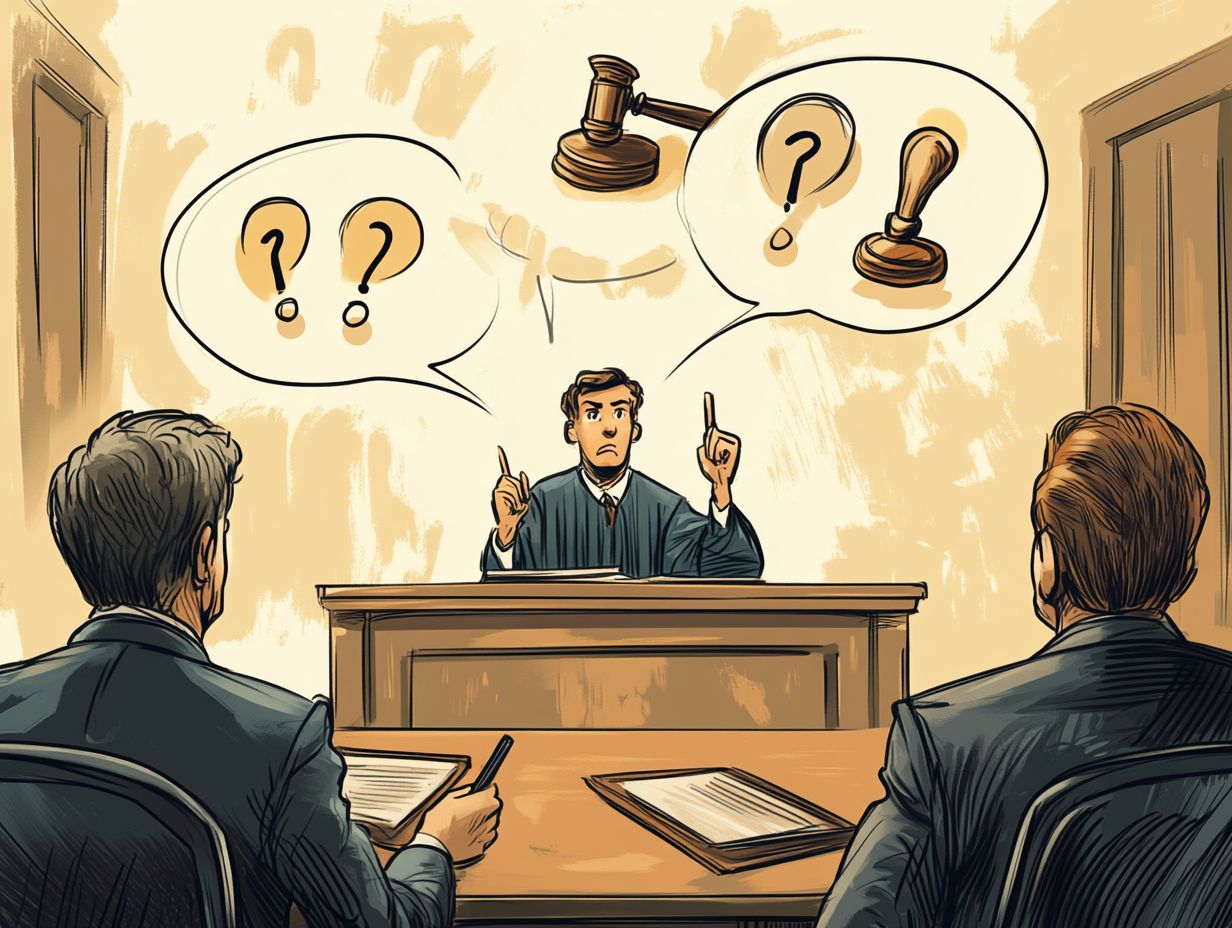
Choosing the wrong defense strategy can have serious consequences, and time is of the essence! You could face procedural errors that jeopardize your legal rights and diminish your chances for a favorable outcome.
When you navigate the complexities of the legal system, ineffective defense choices can ripple throughout the entire process.
Imagine opting for a plea deal without fully grasping its ramifications, ending up with a long-term criminal record that significantly hampers your future employment prospects.
Or consider a situation where your defense counsel fails to present critical evidence, leading to a wrongful conviction.
This shows just how crucial thorough preparation is!
Informed decision-making not only safeguards your rights but also plays a vital role in securing a fair trial.
The significance of selecting the right defense strategy cannot be overstated.
How Can a Defense Attorney Help in Developing a Strong Defense Strategy?
A skilled defense attorney plays a crucial role in crafting a robust defense strategy by honing their legal representation skills, mastering courtroom tactics, and leveraging their experience in negotiating plea deals that serve your best interests.
They take the time to analyze evidence meticulously, pinpointing any inconsistencies or gaps that could undermine the prosecution’s case.
By consulting with forensic experts or other specialists, they cultivate a comprehensive understanding of the technical aspects that could influence the outcome of your case.
A defense attorney ensures that all your constitutional rights are upheld, safeguarding you against any potential overreach by law enforcement.
For instance, employing expert testimony to challenge eyewitness accounts has proven invaluable, especially in cases where misidentification is a concern.
These strategies not only bolster the defense’s credibility but can also pave the way for favorable verdicts or dismissals, enhancing your chances for a positive outcome.
What Are the Most Effective Ways to Challenge the Prosecution’s Evidence?
Challenging the prosecution’s evidence is vital to your criminal defense strategy. Effective methods include carefully examining the credibility of witnesses and questioning the legality of how evidence was collected.
Defense attorneys often file motions to exclude evidence that may have been obtained unlawfully, arguing that such evidence infringes on your rights. Cross-examining witnesses allows them to uncover inconsistencies in their testimony, further weakening the prosecution’s narrative.
Utilizing testimony from specialists in a field can offer fresh perspectives, guiding jurors toward alternative interpretations of the presented evidence. Skilled legal guidance can make a big difference in your case!
Watch this video to learn more about challenging prosecution evidence!
Frequently Asked Questions
Let s bust some common myths about criminal defense strategies!
Myth #1: All cases can be won with the right defense strategy.
While a good defense strategy can greatly increase a person’s chances of a favorable outcome, not all cases can be won. Factors such as evidence, witnesses, and the strength of the prosecution’s case all play a role in the outcome of a trial.
Myth #2: A lawyer can always get charges dropped.
While a lawyer can negotiate with the prosecution and potentially get charges reduced or dismissed, they do not have the power to simply make charges disappear. The decision to drop charges lies with the prosecutor and ultimately, the judge.
Myth #3: Expensive lawyers are always better at defending criminal cases.
The cost of a lawyer does not necessarily determine their skill or effectiveness in defending a criminal case. There are many highly skilled and successful lawyers who offer affordable rates.
Myth #4: A good defense strategy is only necessary for serious crimes.
Even for minor offenses, having a strong defense strategy can greatly improve the outcome of a case. It is important to have a lawyer who can negotiate for reduced charges or lesser penalties.
Myth #5: A defense strategy only involves proving innocence.
While proving innocence is certainly a goal of a defense strategy, it is not the only approach. A good defense lawyer will also focus on finding weaknesses in the prosecution’s case and presenting alternative explanations or defenses.
Don’t let these myths hold you back consult a professional to understand your rights and options!

